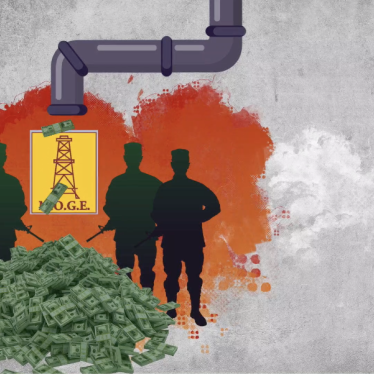October 20, 2021
We are writing on behalf of Human Rights Watch concerning ownership by your firm (or funds or entities under its control) of energy companies, including Total Energies, PTT (and its subsidiary PTTEP), Chevron, and POSCO, which are involved in business operations in Myanmar that benefit the junta formed after Myanmar’s military, known as the Tatmadaw, staged a coup in February 2021 and nullified democratic elections in 2020.
Human Rights Watch is a nongovernmental organization that monitors and reports on human rights in over 100 countries. We have reported on human rights abuses in Myanmar for over three decades.
We are writing to urge your company to use its influence as major shareholders in the companies named above to convince their leadership to support measures, set out below, that will stop payments that are contributing to or enabling the junta’s ongoing human rights violations.
Since the February coup, Myanmar’s military junta, called the State Administration Council, has carried out a brutal crackdown on anti-coup protests across the country. Security forces have repeatedly used excessive and lethal force, including military assault weapons, mortars, and grenades against largely peaceful protesters. To date, security forces have killed over 1,000 people, including at least 75 children, some as young as 5. Despite recent releases of some protesters, the junta is still holding thousands of activists, journalists, civil servants, and politicians.
Human Rights Watch has determined that serious abuses committed by the junta as part of a widespread and systematic attack on the population amount to crimes against humanity. Atrocities documented by Human Rights Watch and other rights groups have included murder, enforced disappearance, torture, rape, severe deprivation of liberty, and other inhumane acts causing great suffering.[1]
The junta has undertaken no meaningful investigations or efforts at accountability for these abuses, or for past abuses in which the military was implicated before the coup. The Tatmadaw has long defied international calls for accountability for atrocities by its forces, including crimes against humanity and acts of genocide against ethnic Rohingya, and war crimes against other ethnic minority communities.
Following the February coup, several governments, including the United States, Canada, United Kingdom, and European Union member states, have imposed targeted economic sanctions on junta leaders and conglomerates and companies owned or controlled by the Tatmadaw. However, foreign governments have yet to impose sanctions or other economic measures to stop funds that are being paid to the military’s single largest recipient of foreign currency revenue: the military-controlled Myanmar Oil and Gas Enterprise (MOGE).[2]
Human Rights Watch and others have reported that MOGE currently has joint ventures with several energy companies that together produce approximately US$1 billion in revenues sent to MOGE or other Myanmar military-controlled accounts, in the form of fees, taxes, royalties, and revenues from the export of natural gas, most all of which goes by pipeline to Thailand or China. The companies involved in joint ventures with MOGE include Total Energies, PTT, Chevron, and POSCO.[3]
According to recent regulatory filings in the US and other jurisdictions, reviewed by Human Rights Watch, your firm or its funds are major institutional shareholders of one or more of the following companies: Total Energies, Chevron, PTT or its subsidiary PTTEP, and POSCO.
Total Energies, Chevron, PTT, and POSCO face heightened reputational risks because of payments from their ventures to MOGE or other military-controlled entities, and the economic partnerships with MOGE that contribute to funding the military. Even prior to the coup, the UN-backed Fact-Finding Mission on Myanmar warned all foreign companies engaging with the military or entities under its control that they faced a “high risk of contributing to, or being linked to, violations of international human rights law and international humanitarian law. At a minimum, these foreign companies are contributing to supporting the Tatmadaw’s financial capacity.” Companies may also face heightened financial or legal risks if other governments impose new sanctions on MOGE or take other measures against the junta.
To stop revenues from gas production flowing to the Myanmar military, Human Rights Watch is calling on concerned governments to block revenue payments from foreign companies to MOGE and other government-controlled entities, including payments made by ventures involving Total Energies, Chevron, PTT, and POSCO. We are also calling on these companies to support such measures. In our communications with several of these companies, we have noted that financial sanctions can be tailored to block transactions to the junta or seize them in foreign accounts, without impacting operations of companies in Myanmar, thereby minimizing negative effects on gas transportation and energy production in Myanmar, Thailand, and China.
As major shareholders in companies operating in Myanmar’s gas sector and a business enterprise subject to the UN Guiding Principles on Business and Human Rights, your firm and the funds and companies it owns have a responsibility to use their influence so that these companies’ operations do not contribute to the military junta’s adverse human rights impacts. We also note that an increasing number of jurisdictions are adopting legislation that legally require companies, including those in which you own shares, to conduct human rights due diligence over operations (including France’s “Duty of Vigilance” law, Germany’s new supply chain law, and the EU’s planned human rights due diligence legislation), resulting in companies facing increasing risk of legal penalties if they fail to address activities that contribute to human rights abuses.
Should Total Energies, Chevron, PTT, and POSCO continue to engage in economic activities that add to the junta’s revenues and contribute to the junta’s ability to oppress the country’s population, they will be increasing the risks to their reputations while heightening legal or financial risks. As an institutional investment institution, your company has fiduciary responsibilities to those who purchase its investment products and uses its financial advisory services, including a duty of prudence and duty of care.
We urge your firm to publicly call on the leadership of Total Energies, Chevron, PTT, and POSCO to explain their positions regarding sanctions or other financial measures such as those detailed above and elaborate on what other measures, if any, they are taking or considering taking to avoid contributing to the junta’s abuses. We would also urge your company to publicly support new financial sanctions aimed at stopping revenue from going to Myanmar’s junta.
We would appreciate learning what actions you have taken or plan to take to address this situation by November 2, 2021, so that it may accurately be reflected in our reporting. We would also welcome an opportunity to discuss these issues with you in further detail.
Thank you for your assistance in these matters. If you wish to contact us, please find our contact information below.
Sincerely,
John Sifton Arvind Ganesan
Asia Advocacy Director Business and Human Rights Director
[1] In September 2021, the United Nations Special Rapporteur on the situation of human rights in Myanmar, Tom Andrews, stated that the junta’s responsibility for “widespread and systematic attacks against the people of Myanmar” were grounds for “a compelling case that the military junta is committing crimes against humanity.”
[2] Before the coup, the military already exercised extensive control over MOGE with much of its revenues sent into “Other Accounts,” for exclusive use by the military for its own expenditures. Since the coup, the junta has seized control of all government ministries and state-owned enterprises and their bank accounts inside and outside of the country.
[3] By far the largest share of revenues paid to MOGE are made via the majority Thai state-owned PTT, which purchases approximately 80 percent of Myanmar’s exported natural gas from various ventures owned with Total, Chevron, its subsidiary PTTEP, and MOGE. PTT separately owns a majority stake in joint ventures with POSCO and MOGE, which transport and sell gas to China.







